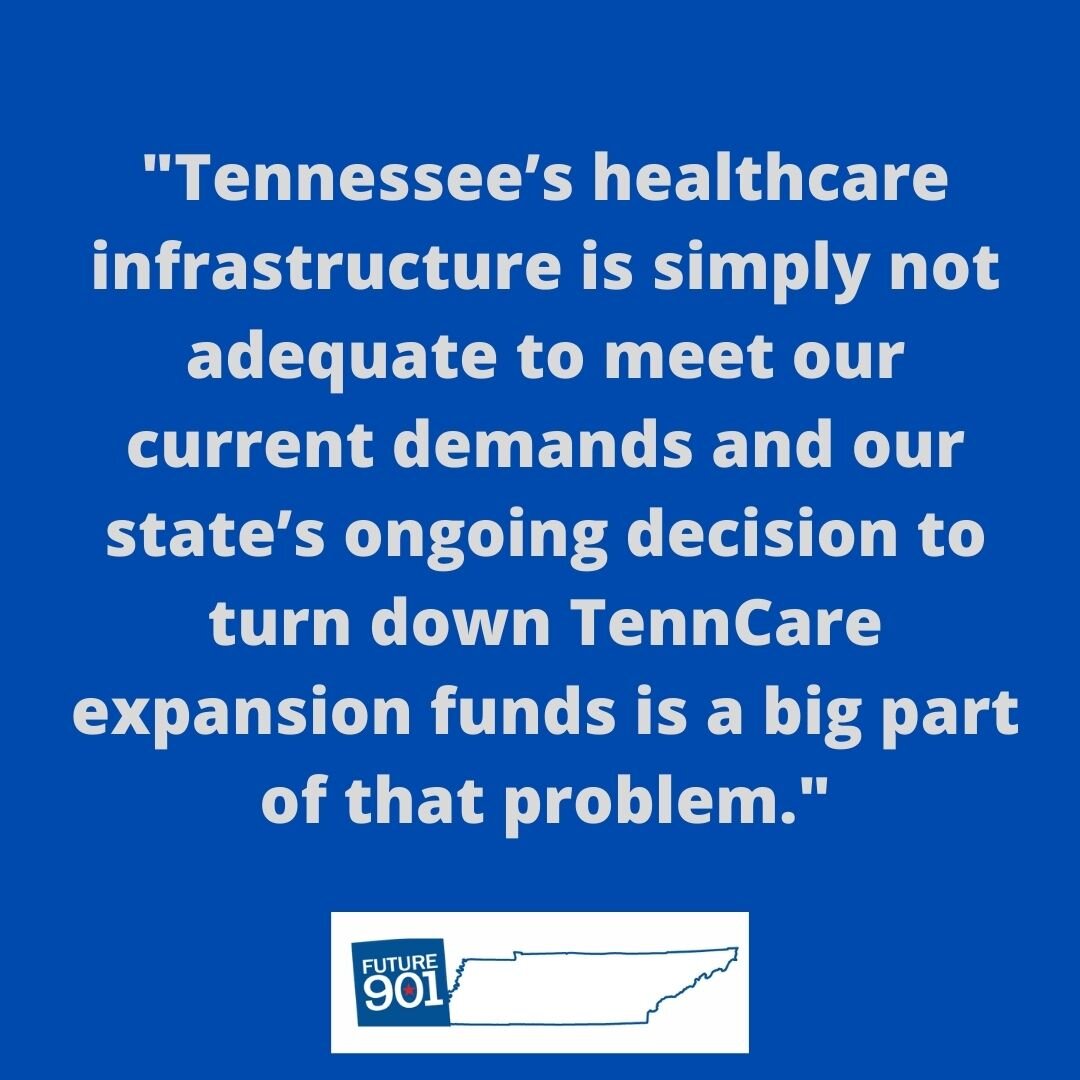A Self-inflicted Healthcare Shortage Is Killing Tennesseans, The Block Granting Scheme Is Going To Make It Worse
Written by Robert Donati, Future901 Treasurer
Tennessee is in a healthcare hole and our government keeps digging.
Shelby County, like the rest of the state, faces an ongoing healthcare crisis from the COVID-19. Like everyone else, I have followed the news closely as hospital capacity has dwindled and deaths have soared. As an attorney whose practice involves helping the injured and the disabled, I have increasingly seen the secondary casualties of the epidemic.
Obtaining treatment for conditions unrelated to COVID-19 has become increasingly difficult as limited healthcare resources are directed to containing the virus. My clients have seen orthopedic surgeries and physical therapies delayed. Other individuals that would normally be appropriate for evaluation in an emergency room have faced unworkably long waits or have been forced to go without care. Though we haven’t been calling it this, care is being rationed in our county and throughout the state and it is putting everyone at risk.
How long will this rationing last?
Worse still, we need to recognize the increasingly likely prospect that this rationing may continue for years if the Governor and the Legislature do not get serious about strengthening our healthcare infrastructure by expanding TennCare. Unfortunately, Gov. Lee and the Legislature have inexplicably decided to set the state on a course to DECREASE our healthcare resources through the unprecedented move of adopting a block granting scheme for TennCare.
So, I in writing this I do not wish to engage in the same back and forth that we continually see about COVID-19, its causes, ways to prevent it, etc. Instead, I wanted to write and point out what should be obvious, but is never mentioned. Tennessee’s healthcare infrastructure is simply not adequate to meet our current demands and our state’s ongoing decision to turn down TennCare expansion funds is a big part of that problem.
Similarly, Gov. Lee’s new block granting is being sold to the public as a mechanism to save money. In healthcare, with very few exceptions, “savings” translates into cuts. The Governor assures that the block grant won’t affect who is eligible for the program. This will therefore likely mean that the expected “savings” will translate into cuts in what coverage is paid for under the program and the rate at which providers will be paid.
Why is Tennessee rejecting $1.4 billion?
First, for those that don’t know, Tennessee is one of a handful of remaining states that is still rejecting funding offered to it under the Affordable Care Act to expand Medicaid (TennCare) eligibility. The state rejects roughly $1.4 billion annually in additional funding.
A reasonable concern among state leaders initially was that Tennessee would be responsible for covering about 10% of the costs associated with the expansion. In response, then Governor, Bill Haslam worked out a deal with the Tennessee’s hospitals to cover most of the cost through a tax they would pay. Since those hospitals would see substantially increased revenue from newly-insured patients, the cost of that hospital tax would be covered with revenue to spare. It would have been a sound move for Tennessee’s hospitals, fiscally responsible and it would a huge boon to Tennesseans without health coverage.
Unfortunately, not everyone agreed with Gov. Haslam’s plan. A group of GOP legislators, led by State Senator Brian Kelsey (District 31) effectively blocked Haslam’s Insure Tennessee plan. The effects of scuttling Insure Tennessee were swift and long-lasting. It triggered immediate layoffs in staff from hospitals across the state. It has led to one of the country’s largest rate of uninsured. The estimates on the rate of uninsured vary, but it was recently around 10%. This, in turn, has led to Tennessee leading the country in medically-related bankruptcies per capita. Similarly, throughout rural Tennessee (including multiple hospitals in West Tennessee) we have seen 10 hospitals close their doors.
The impact on Tennesseans without access to affordable healthcare
When people with access to healthcare hear that 1/10 Tennesseans don’t have insurance, they can be forgiven for thinking that this problem doesn’t affect them. Similarly, when folks in Shelby or Davidson County consider rural hospitals closing, they probably don’t see how that impacts. However, COVID-19 has been a giant stress test for our healthcare infrastructure. The result shows us exactly how connected all of us are.
First, consider the feel-good headline from Methodist Hospital in 2019 that it was going to voluntarily erase $11.9 million in medical debt owed to it by (primarily) uninsured patients. Then think about what that headline really represents. The majority of that money would not have been debt billed to Tennessee patients in the first place had Haslam’s plan been adopted. The hospital was incurring a major operational loss because Sen. Kelsey and others chose to forgo the money available to the state. Some large portion of that money would have been reimbursed to Methodist through TennCare expansion. How many nurses could that system have hired if it had that money in revenue from TennCare?
Why conversations around COVID-19 miss the bigger picture
Returning to the present, if you wade into the comments section of any news article on the pandemic and its affect on the Mid-South, you will see the same discussion play out over and over. Some people push the narrative that hospitals are at capacity because of a nursing shortage and not COVID-19. Alternatively, there is the recurring "how many of these are really COVID-19 cases?" argument.
These folks have points. After all, the old Commercial Appeal building is vacant because of a lack of staffing not space. However, from a policy perspective this misses the bigger point. The point is that we simply do not have the capacity to handle our healthcare demands. This is BEFORE the state set about CUTTING healthcare dollars in block granting.
There is absolutely a nursing shortage nationally and Tennessee is not immune to that. What people gloss over though is that Tennessee's failure to invest state dollars in healthcare infrastructure, in particular our failure to take billions in TennCare expansion funds, helped cause our particular shortage.
When our local hospitals have to absorb most of the cost of caring for the 10% of Tennesseans without health insurance, they simply have less money to spend on salaries and staff. In a national labor market that is competing for nurses and doctors, cutting reimbursement rates, on top of saddling providers with the cost of uninsured care, it is only going to make our local shortage worse.
So, from the moment Sen. Kelsey and his band blocked TennCare expansion, he has put us on a course to where we are now. Today, hospitals are again cancelling elective surgeries for lack of staffing. People are frequently being turned away from ERs. We are at a point of rationing care. For all of those worrying about “death panels” during the ACA fight, we have effectively forced them on ourselves.
What are the long-term prospects?
The next thing that we need to realize collectively is that there is real indication that our healthcare system is going to stay taxed for a significant time to come. There is significant reason to doubt that the US, much less Tennessee, is going to get to herd immunity for COVID-19 soon. Dr. Lisa Piercey, who leads the Tennessee Department of Health recently noted an unexpected reluctance among even healthcare workers in getting COVID-19 vaccinations. This is similarly playing out in numerous other cities across the country.
So, what does that mean? It means that COVID-19 rates may improve as some portion of the state gets vaccinated, but it could take years for it to really go away. This will mean that the healthcare system that has been beyond capacity over the past year will stay that way. So, for people with insurance the status quo will mean that stroke victims or accident victims may show up at ER’s that are not staffed up enough to save their lives. It will mean that people needing elective surgery will routinely see their procedures bumped. People will be turned away or face increasingly long wait times to see a doctor.
Tennessee is at a crossroad
Our healthcare infrastructure in Tennessee is at a crossroads. The system desperately needs resources and it needs them now. Indicators are not just that we are in a crisis, they are that we are in a new “normal.” None of us should be ok with that. It is time to recognized reality and take the help that is being offered to us. It is time to expand TennCare. It is time to withdraw this block grant scheme. It is time to build a health care infrastructure that works for all of us.
Written by Robert Donati, Future901 Treasurer

